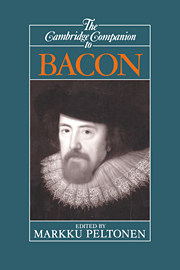Book contents
- Frontmatter
- Introduction
- 1 Bacon's idea of science
- 2 Bacon's classification of knowledge
- 3 Bacon's method of science
- 4 Bacon's forms and the maker's knowledge tradition
- 5 Bacon's speculative philosophy
- 6 Bacon as an advocate for cooperative scientific research
- 7 Bacon's science and religion
- 8 Bacon and rhetoric
- 9 Bacon and history
- 10 Bacon's moral philosophy
- 11 Bacon's political philosophy
- 12 Bacon's legacy
- Bibliography
- Index
6 - Bacon as an advocate for cooperative scientific research
Published online by Cambridge University Press: 28 May 2006
- Frontmatter
- Introduction
- 1 Bacon's idea of science
- 2 Bacon's classification of knowledge
- 3 Bacon's method of science
- 4 Bacon's forms and the maker's knowledge tradition
- 5 Bacon's speculative philosophy
- 6 Bacon as an advocate for cooperative scientific research
- 7 Bacon's science and religion
- 8 Bacon and rhetoric
- 9 Bacon and history
- 10 Bacon's moral philosophy
- 11 Bacon's political philosophy
- 12 Bacon's legacy
- Bibliography
- Index
Summary
An important aspect of Bacon's “total reconstruction of sciences, arts, and all human knowledge” (IV, 8) was the organizational and institutional restructuring of natural philosophy. His rhetoric of a revolution in learning was similar to that employed by a number of his near contemporaries, but his vision of how it would be achieved differed. Unlike Descartes, for example, who retained the traditional philosophical emphasis upon the power of individual reasoning, Bacon sought to institute a new method for the investigation of nature, based upon the cooperative efforts of a large workforce.' Bacon's advocacy of cooperative research was in part responsible for his sharp criticism of traditional learning.
- Type
- Chapter
- Information
- The Cambridge Companion to Bacon , pp. 146 - 171Publisher: Cambridge University PressPrint publication year: 1996
- 13
- Cited by

